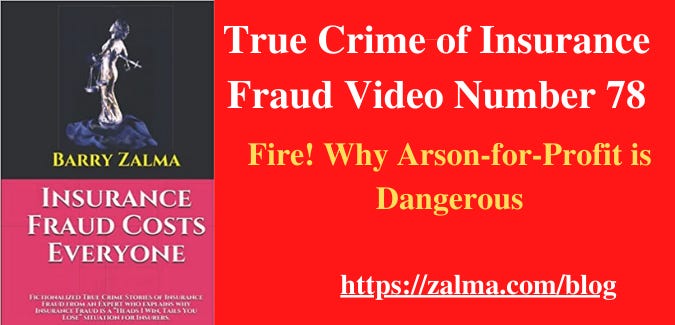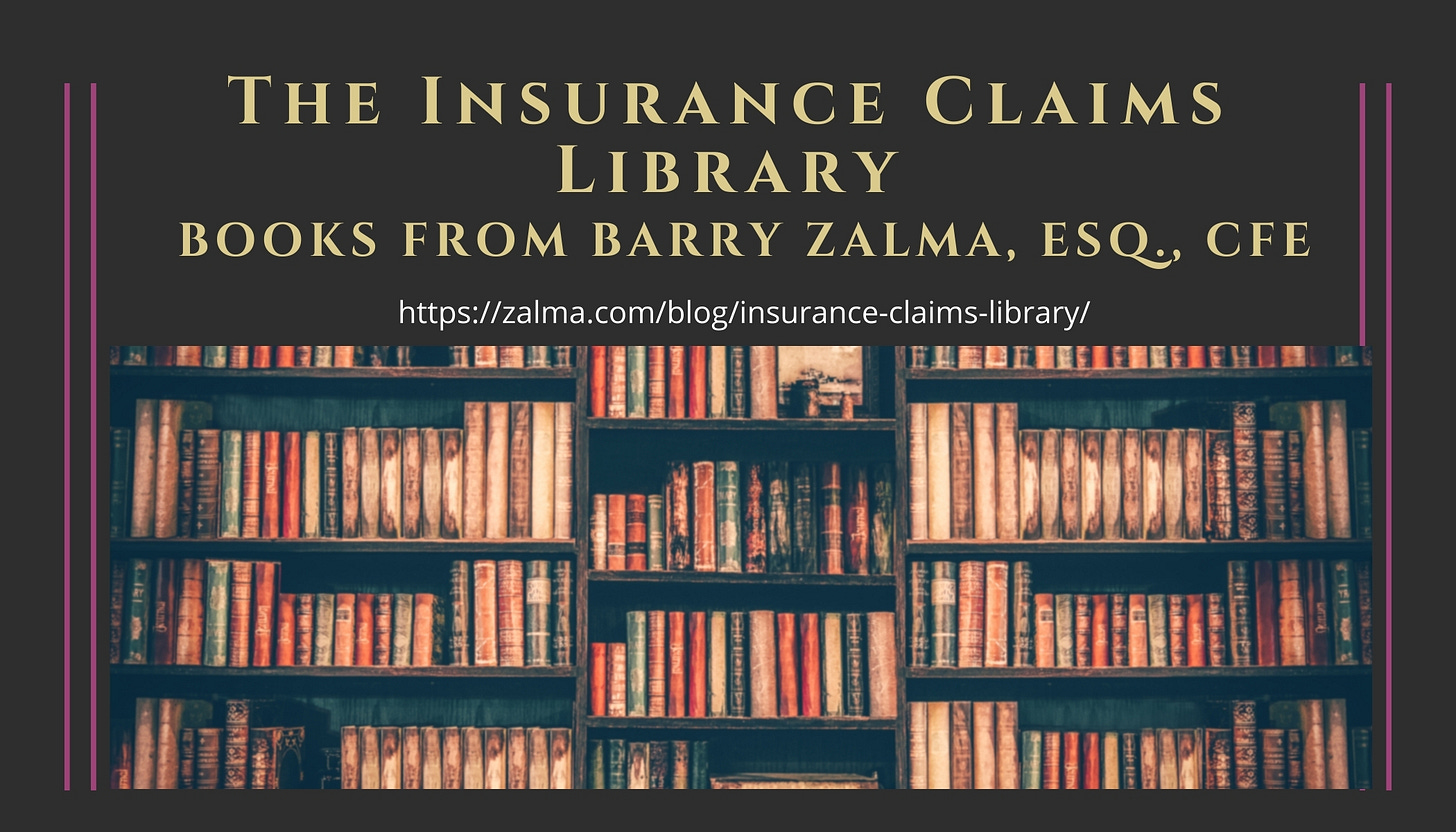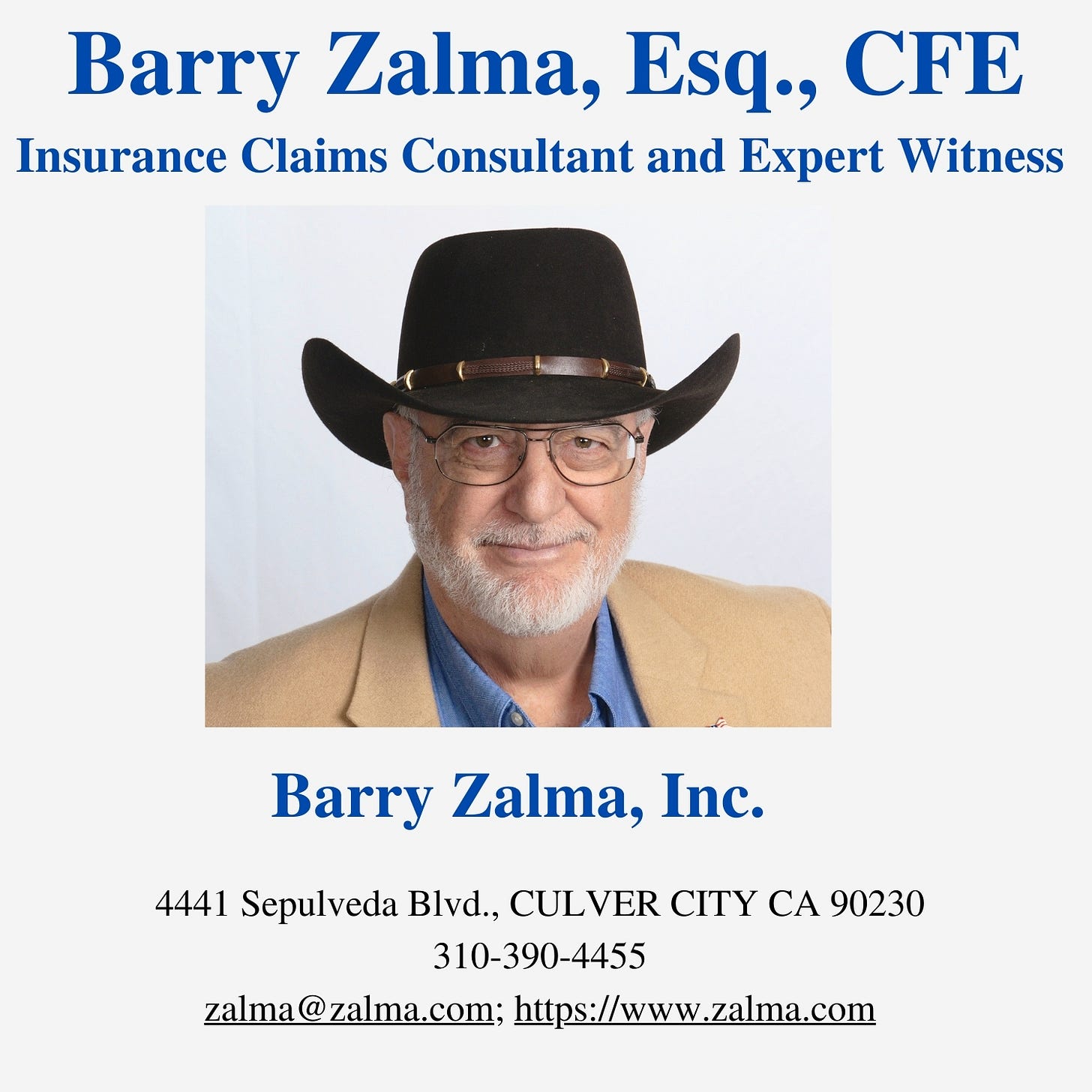True Crime of Insurance Fraud Video Number 78
Fire! Why Arson-for-Profit is Dangerous
Read the full article at https://lnkd.in/gu7GS9cr and see the full video at https://lnkd.in/gPEKpb7D and at https://lnkd.in/gpRbp_u4 and at https://zalma.com/blog plus more than 4200 posts.
The crime of arson is violent. Not only is property damaged, people die. Most arson fires are set for spite, anger, vengeance or spousal abuse. Approximately 25 per cent are set to defraud insurers. Fires set to defraud an insurer are called, by arson investigators, “arson for profit.”
Because most perpetrators do not understand uncontrolled fires, they believe arson is simple and risk free. The nascent arsonist believes all the evidence that might tie him to the crime will be consumed by the fire. He or she is mistaken.
Ben Standish was an arsonist who might have tried a less violent crime if he knew more about fire. Had he known that evidence will remain after the fire is extinguished by the fire fighters his house would not be a charred hulk. Had he known that it is difficult to avoid injury he would have filed a personal bankruptcy rather than use arson as a method to get out of debt.
Ben Standish was upside down on his mortgage and a balloon payment was due. The value of his house had decreased $200,000 in the last two years. He could not find a lender willing to lend him enough to cover the balloon payment which was $100,000 more than the fair market value of the house. He was desperate.
Ben decided that his only solution was to burn down his house and sell it to his insurance company. An honest man, faced with the shame of bankruptcy, decided that defrauding an insurance company was not criminal. He had paid them premiums for 10 years with no claims. They owed him.
Ben owned a shoe store. He was very successful and had no problem making the monthly payments on his $600,000 home loan. Ben Standish was cash poor. He couldn’t make up the difference between the amount a bank would lend and the amount he needed to pay the balloon payment. He had three weeks and, to his mind, no choice.
A graduate of Venice High School who had taken two business classes at Pasadena City College, Ben had no training, knowledge or background in the activities and uses of fire or flammable liquids. Ben had seen a movie on television called “Batteries Not Included” where a professional arsonist burned down an apartment building in the Bronx. Standish decided to emulate the person in the movie. A fire at his house would pay off the mortgage. His debt problem would be solved. He would then borrow the money needed to rebuild a house on the soon to be empty lot.
The day after his wife left for Atlanta, Ben rented, under the name George Johnson, a public storage unit approximately 12 feet by 10 feet. He carefully moved into that unit his jewelry, his wife’s jewelry (that she didn’t take to Atlanta), a new Sony 60-inch Plasma T.V., DVR and Surround Sound system. All the family DVDs. video tapes, photographs and accounting records that would be impossible to replace, he moved to the storage unit. When he was finished, the storage unit was filled. He purchased a separate policy through the facility to cover more than $150,000 of valuable goods and all of the private papers and photographs of the family he had stored at Public Storage unit.
Friday afternoon, after closing his shoe store, Ben visited his local Shell Service Station and filled a five-gallon can with gasoline. He went to the PayLess Drug Store and bought a package of balloons and at the Ace Hardware store next to the PayLess he purchased a carpenter’s staple gun.
The fire department arrived at the scene of the fire within minutes. Streams of water were placed on the scene and the fire was extinguished. Because of the flash of the explosion most of the balloons, Ben had stapled to the ceilings remained intact. The firefighters, expecting a simple residential fire sat down on the front steps and curb and shook with fear. They recognized that if one of those balloons had let loose it would have caused an explosion that could have killed any one or all of the firefighters. Their Captain, so angry at the danger his men had faced, was almost speechless as he called for an arson unit to come to the scene of the fire.
“It’s O.K. Orson. I’m calmed down now. But the sonofabitch hung balloons full of gasoline all over the ceiling. If we didn’t have the fire out immediately, we would have dead firefighters here on the grass. You’ve got to get the person who did this fire.”
“Have you done any overhaul, Captain?”
“No. As soon as the fire was out and no longer a danger to the rest of the neighborhood, I had the firefighters stand down and set up a security perimeter. No one has been in the house but the firefighters.”
Campizi grabbed his camera and slung it over his shoulder, pulled a shovel and a broom from his car trunk and walked into the house.
Four hours later Campizi had taken 72 photographs of the scene of the fire, collected four gasoline filled balloons, six one-gallon cans of cloth and carpeting Campizi believed were soaked in gasoline, a small plastic package with a label stating that it contained 10 “Happy Birthday” balloons. The bar-coded price tag was still visible and showed the balloons were purchased from a PayLess Drug Store.
The Captain, and two uniformed police officers stood next to the pumper drinking from Styrofoam cups what appeared to be coffee. As Campizi approached, they stood to attention anxiously awaiting his arrival. Behind the yellow tape there were 10 men in business suits holding clip boards. Campizi recognized them as solicitors for various firms of public insurance adjusters who seemed to appear at every fire scene. They were all talking to each other since the owner had yet to arrive.
“Mr. Standish, you are under arrest. I must inform you that you have the right to remain silent and refuse to answer any questions I pose to you; you have the right to have a lawyer present while I question you. Do you want to waive the rights I have just explained to you?”
“Sure, I will waive the rights. You’ve got me red-handed.”
“And those vultures trying to sign him up will get nothing.”
“Not really. They’ll find the mortgage holder and sign it up. Even when we prove Standish burned down his house his insurance company still must pay the mortgagee.”
“You’re kidding. You mean if he goes to jail, he still succeeds in getting out of the debt?”
“Yes. And you thought crime doesn’t pay.”
“Orson, I’ll never say anything bad about my insurance company again.”
ZALMA OPINON
Arson is the least effective and most dangerous method to defraud an insurer. Even a hot-burning gasoline fed arson for profit leaves physical evidence. A fire will seldom destroy everything.
(c) 2022 Barry Zalma & ClaimSchool, Inc.
Barry Zalma, Esq., CFE, now limits his practice to service as an insurance consultant specializing in insurance coverage, insurance claims handling, insurance bad faith and insurance fraud almost equally for insurers and policyholders. He practiced law in California for more than 44 years as an insurance coverage and claims handling lawyer and more than 54 years in the insurance business. He is available at http://www.zalma.com and zalma@zalma.com.
Subscribe to Zalma on Insurance at locals.com https://zalmaoninsurance.local.com/subscribe.
Subscribe to Excellence in Claims Handling at https://barryzalma.substack.com/welcome.
Write to Mr. Zalma at zalma@zalma.com; http://www.zalma.com; http://zalma.com/blog; daily articles are published at https://zalma.substack.com.
Go to the podcast Zalma On Insurance at https://anchor.fm/barry-zalma; Follow Mr. Zalma on Twitter at https://twitter.com/bzalma; Go to Barry Zalma videos at Rumble.com at https://rumble.com/c/c-262921; Go to Barry Zalma on YouTube- https://www.youtube.com/channel/UCysiZklEtxZsSF9DfC0Expg; Go to the Insurance Claims Library – https://zalma.com/blog/insurance-claims-library/







